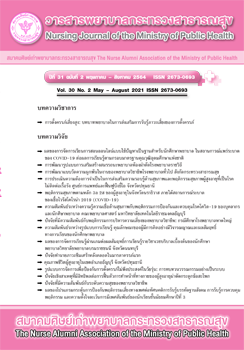Factors Associated with Self-Care Behaviors Glycemic Control in Patients with Type 2 Diabetes Mellitus
Main Article Content
Abstract
A cross-sectional study was designed to examine the relationship between personal factors, knowledge of diabetes, self-regulatory ability, and self-care behaviors in glycemic control in patients with diabetes mellitus (DM) Type 2. The sample consisted of 403 patients who visited the diabetes clinic of primary care units in Samut-Sakhon province from August to October 2020. Questionnaires that included personal factors, knowledge of diabetes, ability to self-regulate, self-care, and self-care behaviors were used as instruments for data collection. The reliability coefficients of the questionnaires were .73, .83, .75, and .77, respectively. The data were analyzed using frequency, percentage, mean, standard deviation, and binary logistic regression. The result showed that the mean scores for knowledge of diabetes, self-care, and ability to self-regulate were at a high level (8.54, 32.85, and 44.49, respectively). In the relationship study, personal factors on follow-up care, self-preparation for food, and having family members with diabetes, knowledge of diabetes and self-care were statistically significant associated with self-care behaviors for glycemic control at the .05 level. Therefore, nurses and public health workers should promote self-care behaviors for glycemic control by emphasizing self-regulation to improve knowledge of self-care, follow-up care, and self-cooking for better self-care behaviors and glycemic control.
Article Details
บทความและรายงานวิจัยในวารสารพยาบาลกระทรวงสาธารณสุข เป็นความคิดเห็นของ ผู้เขียน มิใช่ของคณะผู้จัดทำ และมิใช่ความรับผิดชอบของสมาคมศิษย์เก่าพยาบาลกระทรวงสาธารณสุข ซึ่งสามารถนำไปอ้างอิงได้
References
2. Division of non-communicable diseases, department of disease control. Annual report, bureau of non-communicable diseases department of disease control, ministry of public health 2019. Bangkok: The War Veterans Organization of Thailand Printing Office;2019.(in Thai).
3. Buakham T. Factors related of blood sugar control in diabetes patients in Nongpakam health promotion hospital [internet]. 2018[cited 2019 August 18]. Available from: www.ldm.in.th/cases/300
4. Nuntasak S, Durongrittichai V, Khungtumneum K. Development of care system model for people with uncontrollable type 2 diabetes mellitus by using chronic care model for Bueng Sanan health promoting hospital. Journal of Public Health and Development 2017;14(2),77-89.(in Thai).
5. Institute of medical research and technology assessment, department of medical service, ministry of public health. Diabetes and hypertension report [internet]. 2018[cited 2019 August 12]. Available from: http://www.imrta.dms.moph.go.th/imrta.
6. International health policy program, Thailand ministry of public health. Report of the burden of diseases and injury of the Thai population 2016-2019. Nonthaburi: The graphico systems company limited. 2019. (in Thai).
7. Samut Sakhon provincial health office. Report of Samut Sakhon provincial health office;2019, copyright. (in Thai).
8. Office of policy and strategy, ministry of public health. Ministry of public health strategic plan 2017-2021 [internet]. 2019[cited 2019 August 12]. Available from:http://kmops.moph.go.th/index.php.
9. Chaengpromma K, Khongtong Patthanan. Factors related to HbA1c levels in type 2 diabetic patients at Prayuen hospital in Khon Kaen province. Journal Srinakharinwirot University (Science and Technology) 2017;10(19):1-13.(in Thai).
10. Khuneepong A. Factors influencing self-care behavior of type 2 diabetic mellitus patients in Phatthana Nikhom district Lop Buri province. Journal of The Department of Medical Services 2019;43(3):101-7.(in Thai).
11. Suwattanakul T. Factors related to blood sugar control among diabetes mellitus type 2 patients. Journal of Health System Research 2018;12(3):515-22.(in Thai).
12. Boonprasit S, Somanusorn S, Sumngern C. Factors related to self-management for controlling plasma glucose in uncontrolled diabetes elderly. Journal of Boromarajonani College of Nursing, Bangkok 2016;32(1):44-56.(in Thai).
13. Junsukon E, Srijaroen W, Samruayruen B. Factors predicting self-care behaviors in type 2 diabetes mellitus patients in amphoe Mueang, Phitsanulok province. EAU Heritage Journal Science and Technology 2017;11(3):229-39.(in Thai).
14. Bandura, A. Self-efficacy. In V. S. Ramachaudran (Ed.), Encyclopedia of human behavior. New York: Academic Press;1994. (Reprinted in H. Friedman [Ed.], Encyclopedia of mental health. San Diego: Academic Press, 1998)
15. Krejcie RV, Morgan DW. Determining sample size for research activities. Educational and psychological measurement 1970;30(3):607-10.
16. Polit DF, Beck CT. Nursing research: generating and assessing evidence for nursing practice. 8thed. Philadelphia: Wolters kluwer health/Lippincott Williams and Wilkins; 2008.
17. Buraphunt R, Muangsom N. Factors affecting uncontrolled type 2 diabetes mellitus of patients in Sangkhom hospital, Udonthani Province. KKU Journal for Public Health Research 2013;6(3):102-9.(in Thai).
18. Hayeepachi N, Pouyfung P. Effective factors associated with controlling blood sugar among diabetes mellitus type 2 patients on follow-up at medical division, Chiang Rai municipality. Journal of Nursing, Public Health, and Education [internet].2019[cited 2020 December 16]. Available: https://he01.tci-thaijo.org/index.php/bcnpy/articleview/203692/157209
19. Kengganpanich T, Leerapan P, Kengganpanich M, Nunthasen K, Lattanand K. Factors related to herbal consumption for controlling blood sugar of patients with type 2 diabetes mellitus. Journal of Boromarajonani College of Nursing, Bangkok 2015;31(1):13-25.(in Thai).
20. Sangsanga U, Navicharern R. Factors related to self-care behaviors and blood sugar level in type 2 diabetes patients. Journal of nursing science Chulalongkorn University 2012;24(2):66-79.(in Thai).

